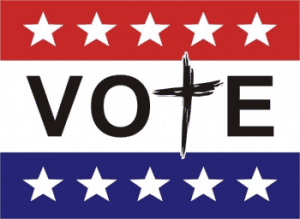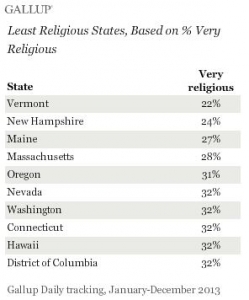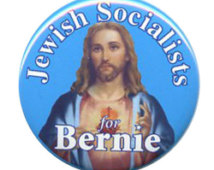The weekly report on the statistics of secularism
by Jordan Auburn
 In the American system there are only two main political parties,┬áthe Democratics and the Republicans, and each will need to choose a single candidate for the 2016 US presidential election. This is done by having each state vote, in┬áa series of “caucuses and primaries”. The first states to vote are especially important, because they show the momentum of each candidate. It’s a test of strength that may indicate how these candidates will do nationwide, influencing campaign contributors, volunteers, media attention, and more.
In the American system there are only two main political parties,┬áthe Democratics and the Republicans, and each will need to choose a single candidate for the 2016 US presidential election. This is done by having each state vote, in┬áa series of “caucuses and primaries”. The first states to vote are especially important, because they show the momentum of each candidate. It’s a test of strength that may indicate how these candidates will do nationwide, influencing campaign contributors, volunteers, media attention, and more.
The first of these statewide contests will be in Iowa (caucus) on February 1st, and New Hampshire (primary) on February 9th. Unexpectedly, secular voters could set the tone.
The declining religiosity of the USA
 Research conducted by Pew Research Center in 2015 demonstrated the oft-quoted sharp drop in religiosity in the USA, with the religiously unaffiliated rising from 16% to 22% between 2007 and 2014. Indeed, according to further research by Pew, the millennial generation (those aged 18-33) is ÔÇ£certain to become a growing share of the electorateÔÇØ: from 25.5% in 2013 to 36.5% by 2020. Millennials are consistently shown to be the most secular, and so this growing share will likely contribute to an overall decline in national religiosity. As the SPIÔÇÖs Johnny Monsarrat noted in our Secular Resource Guide, ÔÇ£that is a powerful voting blocÔÇØ. But what impact might this have over the Iowan caucus and New Hampshire primary?
Research conducted by Pew Research Center in 2015 demonstrated the oft-quoted sharp drop in religiosity in the USA, with the religiously unaffiliated rising from 16% to 22% between 2007 and 2014. Indeed, according to further research by Pew, the millennial generation (those aged 18-33) is ÔÇ£certain to become a growing share of the electorateÔÇØ: from 25.5% in 2013 to 36.5% by 2020. Millennials are consistently shown to be the most secular, and so this growing share will likely contribute to an overall decline in national religiosity. As the SPIÔÇÖs Johnny Monsarrat noted in our Secular Resource Guide, ÔÇ£that is a powerful voting blocÔÇØ. But what impact might this have over the Iowan caucus and New Hampshire primary?
Iowa GOP: Will religion define the vote?
Iowa is religiously conservative. A Pew research paper has shown that at least 83% of Iowans are ÔÇÿabsolutelyÔÇÖ or ÔÇÿfairlyÔÇÖ certain of the existence of God. The secular vote therefore had a limited impact in the 2012 GOP caucus, with Rick Santorum, a devout Roman Catholic who espouses Intelligent Design, winning. Therefore, the most likely outcome of the Ohioan caucus is defeat for Donald Trump, who has had trouble wooing the fervently religious demographic, and victory for Cruz (a Southern Baptist) or Carson (a Seventh-day Adventist). Nevertheless, the caucus provides the GOPs with an opportunity to prove, to some extent, that their votes are contingent on policy, rather than animosity towards nonbelievers.
New Hampshire GOP: Secular sway for Trump
 A Gallup poll taken in 2014 placed New Hampshire as the second least religious state in the USA, which offers the secular bloc a chance to demonstrate its sway. This points to potential success for Trump, who is notably less religious than Iowan frontrunner Cruz. And why is New Hampshire, according to Republican strategist Alex Castellanos, a more likely hunting ground for the business magnate? ÔÇ£New Hampshire is more secular,ÔÇØ says Castellanos. Indeed, given that the eventual Republican nominee has held New Hampshire all but three times since 1952, the secular vote is set to be significant. The early states matter.
A Gallup poll taken in 2014 placed New Hampshire as the second least religious state in the USA, which offers the secular bloc a chance to demonstrate its sway. This points to potential success for Trump, who is notably less religious than Iowan frontrunner Cruz. And why is New Hampshire, according to Republican strategist Alex Castellanos, a more likely hunting ground for the business magnate? ÔÇ£New Hampshire is more secular,ÔÇØ says Castellanos. Indeed, given that the eventual Republican nominee has held New Hampshire all but three times since 1952, the secular vote is set to be significant. The early states matter.
Iowa Democrat: A hold for Clinton
Yet the largest secular impact may come from the blue side. After all, according to this Pew Research study taken in 2012, Democrats are consistently polled as being less religious than their Republican opponents. (All ten of the least religious states, as rated by Gallup, voted Democrat in 2012.) It is perhaps unsurprising then, that Ohio looks to be a stronghold for the religiously inclined Clinton and not Sanders, a largely secular Jew.
New Hampshire Democrat: The secular sway
 In New Hampshire the potential for a secular impact is far greater. Though Clinton has been boosted by BidenÔÇÖs decision to stay off the ballot paper, her lead over Sanders has ping-ponged, with Sanders having polled in front on numerous occasions. The reasons for this are abundant, and his ÔÇ£I am who I amÔÇØ politics, devoid of Super-PAC funding, has certainly played a role. But equally important has been his constitutionally secular outlook, and his extensive period as Senator in the most nonreligious state in the USA, Vermont. We should not underestimate the sway this will have over New HampshireÔÇÖs secular bloc come February 9th.
In New Hampshire the potential for a secular impact is far greater. Though Clinton has been boosted by BidenÔÇÖs decision to stay off the ballot paper, her lead over Sanders has ping-ponged, with Sanders having polled in front on numerous occasions. The reasons for this are abundant, and his ÔÇ£I am who I amÔÇØ politics, devoid of Super-PAC funding, has certainly played a role. But equally important has been his constitutionally secular outlook, and his extensive period as Senator in the most nonreligious state in the USA, Vermont. We should not underestimate the sway this will have over New HampshireÔÇÖs secular bloc come February 9th.
Declining religiosity points to a more powerful secular voting bloc
As the proportion of religious Americans is reduced, so the secular voting bloc will increase in size. This is simply a matter of natural course. While a New Hampshire win doesnÔÇÖt secure the nomination ÔÇô after all, Obama was elected after losing the Democratic primary in 2008 ÔÇô it does provide the momentum that a political outsider such as Trump could thrive on. And such early momentum is essential to a successful campaign ÔÇô just ask Rudy Guiliani.
